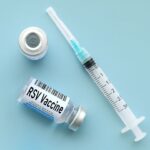Thanksgiving dinner is all about having a big meal while celebrating friends and family. But if you’re on a GLP-1 receptor agonist like Ozempic, it’s understandable to have questions on how to navigate the holiday.
After all, weight loss drugs are designed to make you feel full, and you can have some side effects if you eat too much while taking them. So, how should you approach the holiday when you’re on one of these medications?
Women’s Health tapped two doctors who prescribe them for more.
Meet the experts: Mir Ali, MD, a bariatric surgeon and medical director of MemorialCare Surgical Weight Loss Center at Orange Coast Medical Center in Fountain Valley, CA; Kunal Shah, MD, an assistant professor in the division of endocrinology at the Rutgers Robert Wood Johnson Medical Center
Should I tell relatives I’m taking a weight loss drug?
That’s up to you. Eating habits are on display with Thanksgiving meal. And if you’re concerned about getting comments or questions from loved ones, you could definitely tell them about your medication in advance.
But medications and medical treatment are also personal, and you don’t have to share if you prefer to keep that information private.
Do Thanksgiving foods trigger side effects?
There are some foods that could make the potential side effects of these medications worse, says Mir Ali, MD, a bariatric surgeon and medical director of MemorialCare Surgical Weight Loss Center at Orange Coast Medical Center in Fountain Valley, CA.
“Foods that are heavy in carbs, like rice, stuffing, pasta, macaroni and cheese…these kinds of things are going to slow down the weight loss journey and might make you feel more bloated, nauseous, and uncomfortable,” Ali says.
Sugary and sweet foods can also have the same effect, he says. “It’s best to avoid these,” Ali adds.
Consider going easy on these dishes on Turkey Day:
- Rice
- Stuffing
- Pasta
- Macaroni and cheese
- Candied yams
- Sweet potato casserole
- Green bean casserole
- Mashed potatoes with gravy
- Canned cranberry sauce
- Cream-based drinks
- Cocktails with high alcohol content
- Pecan pie
It’s also important to be mindful of portion sizes. “Go slow,” Ali says. “Sometimes you won’t feel the effects right away but, if you eat too fast, you may get uncomfortable or bloated.”
Some dishes are less likely to cause side effects.
In general—meaning, not just on Thanksgiving—protein-rich foods are a good option when you’re on GLP-1 receptor agonist medications, says Kunal Shah, MD, an assistant professor in the division of endocrinology at the Rutgers Robert Wood Johnson Medical Center. That means turkey is a good choice.
Vegetables, especially steamed or cooked options, are also a good idea, Ali says.
Considering filling your plate with these bites:
- Turkey
- Carrots
- Parsnips
- Brussel sprouts
- Homemade cranberry sauce
- Sauteed or steamed green beans
- Nuts
- Seeds
- Fresh fruit
Overall, Ali just recommends pacing yourself with Thanksgiving, while focusing on protein and veggies.
“Just savor your meal,” he says.
Korin Miller is a freelance writer specializing in general wellness, sexual health and relationships, and lifestyle trends, with work appearing in Men’s Health, Women’s Health, Self, Glamour, and more. She has a master’s degree from American University, lives by the beach, and hopes to own a teacup pig and taco truck one day.
Read the full article here




